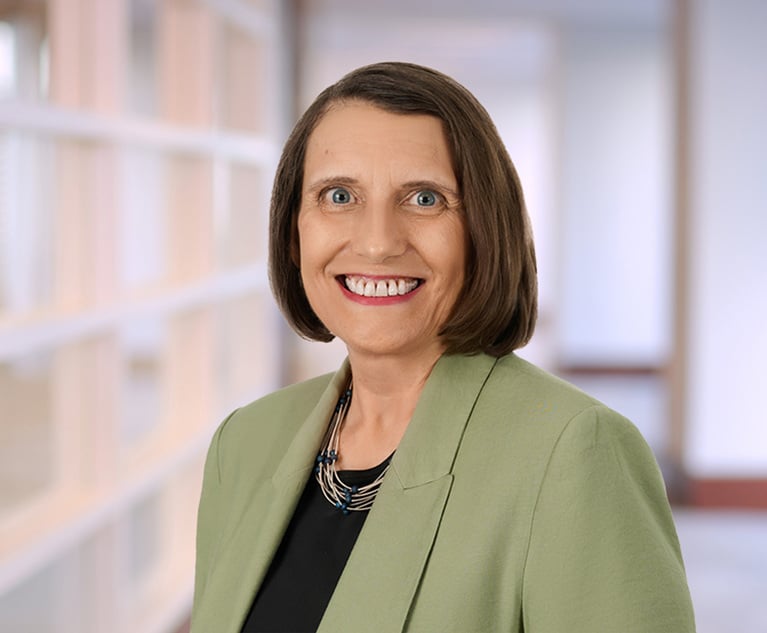Time for Legal To 'Change Its Vocabulary'?: These Law Firms Are Leaving the Concept of Losing a Desk at the Door
"Everybody tends to think of hoteling as giving up something. But in fact, it is the opposite if you get the space right. It gives you the flexibility to use the space for whatever you need," said Perkins Coie's Tammy Baldwin.
April 06, 2022 at 04:12 PM
7 minute read
The original version of this story was published on The Recorder
What You Need to Know
- Law firms are breaking away from the negative connotation of hoteling, or giving up a desk.
- Attorneys are opting into hoteling arrangements in major cities like Austin and Silicon Valley.
- Perkins Coie and Wilson Sonsini adopted software to streamline team-based workspaces.
 Perkins Coie Seattle office. Courtesy photo
Perkins Coie Seattle office. Courtesy photo
'Myriad Positives' as Firms Return in a Hybrid Format
Perkins Coie asked attorneys to return to the office on March 1, though it has not set any requirements. Baldwin, who along with other leaders has been making office tours, noted existing space has been "maximized" and new "technology is ready to go." The firm piloted its hoteling program in its operational headquarters in Seattle, which houses marketing, HR, and finance employees, prior to the pandemic. It gave back one of its three floors and made every single space available for reservation. While the unknown "was a little scary" at first, once the pandemic came along, "the rest was history, and the firm was able to move forward quickly," Baldwin said. Attorneys that expect to be in the office three days a week or more have the option to keep their office. Some attorneys have opted into office-sharing, in which two attorneys share an office. The firm has also created overflow spaces, in the event that both attorneys come into the office on the same day. Attorneys who choose to come in two days a week, or even two days a month, are being enrolled in a hoteling program. The firm's Austin office recently became the first to adopt hoteling for attorneys. It is making similar adjustments to its Palo Alto office, where the firm is downsizing from two buildings to one. At Wilson Sonsini, which returned to the office on March 15, attorneys and staff are asked to be in the office according to practice and office group decisions, according to chief operating officer Chris Boyd. "We adopted an approach that lets each workgroup at the firm decide which schedule makes sense for their client service model, culture, and people," Boyd said, noting that the firm offered attorneys the option to not go back at all, but the majority preferred a hybrid model. He continued, "There were many nights I thought, 'It would have been a lot easier to have a universal rule,' but our approach prioritizes wellness and folks' co-presence," rather than in-office attendance. In the first week returning to the office, there were "myriad positives—most importantly, seeing the reconnections and the happiness on people's faces," he said. Most groups at Wilson Sonsini have decided on two to three days a week in the office, with the majority coming in on Tuesdays and Wednesdays. Executive assistants are asked to be in the office no more than half of the week, ensuring five-day-a-week coverage for attorneys. Similarly, Perkins Coie is asking its professional legal assistants to come in twice a week to ensure on-the-ground support for its practice groups, which has been particularly helpful when attorneys have to deal with "you-never-know" issues that come up on the spot, Baldwin said. Baldwin noted the firm let its professional legal assistants specify the days that would work best for them, and it hasn't been an issue thus far. "One thing that surprised me is that people are coming in on Mondays and Fridays. I thought it would be a ghost town on those days, but it is certainly not," she said. Attorneys at Wilson Sonsini can also opt into a hoteling system, which Boyd himself decided to take advantage of. He said he is looking forward to using the program as a way to "pop into" various offices across the firm's footprint. The firm's newest offices in Salt Lake City and Boulder are also being designed with an office-sharing model in mind, Boyd said, noting the firm does not expect to reduce its overall footprint due to its growth. Fenwick & West, likewise, expects to see its overall footprint slightly increase as it expands to new cities such as Washington, D.C., though it is increasingly efficient in its use of space. The firm, which organized a more formal return to the office on March 21, has not set an in-office mandate for its attorneys. It is instead "encouraging each group and office to work together on an approach that works best for them," according to managing partner Rodger Cole. Cole added, "Our goal is to revive the energy and wellbeing that come from being together in person and integrating all the new faces that have joined us since we went remote. We want to preserve the upsides of working remotely while adding back the very needed benefits of being together in person to develop even stronger working relationships." |
'What About My Shoes?': The Nuts and Bolts of Hoteling
Perkins Coie, Wilson Sonsini, and Fenwick & West are all using commercial software to manage hoteling arrangements. Wilson Sonsini opted to use desk-booking software Condeco, which allows attorneys to view where other members of their group are sitting on any given day; while Fenwick & West selected hoteling software Maptician, which allows attorneys who aren't assigned a specific office to make reservations on their phone or computer. After piloting hoteling software prior to the pandemic, Perkins Coie recently switched to AgilQuest, recognizing the need for a product that had better Internet connectivity and visualization capabilities. The firm's previous software made it so "you were reserving space in a vacuum, and you couldn't see who you were sitting next to until you showed up," Baldwin explained, noting the product also allows attorneys to book space from their phones. Baldwin noted another concern about hoteling surfaced from attorneys questioning where their personal items would be stored. She said, "It really came down to the individual. Everybody was asking, 'Where will my stuff go? What about my shoes? My pictures?'" Perkins Coie is currently using lockers as storage, though Baldwin said she has heard of and likes the idea of using stow filing cabinets, or small, wheeled storage compartments, that can be placed beneath a workstation. Boyd noted that Wilson Sonsini created a system for storing papers, books, and other physical items, which are placed at an attorney's workstation for the day and packed away at the end of the day. He said the firm's approach to returning to the office is reflective "of a different perspective" that, rather than focusing on throwing money at people, prioritizes "the bigger picture" on health and wellness. "As we explored the benefits of the office and remote work, we really focused on the wellbeing of our people," he said. "Coming back, it's been nice to see the theoretical take place in reality, as (people) convene, engage, and build relationships."
This content has been archived. It is available through our partners, LexisNexis® and Bloomberg Law.
To view this content, please continue to their sites.
Not a Lexis Subscriber?
Subscribe Now
Not a Bloomberg Law Subscriber?
Subscribe Now
NOT FOR REPRINT
© 2024 ALM Global, LLC, All Rights Reserved. Request academic re-use from www.copyright.com. All other uses, submit a request to [email protected]. For more information visit Asset & Logo Licensing.
Related Stories
View AllYou Might Like
View All
Eversheds Sutherland Moving After 36 Years to Smaller Atlanta Office
4 minute read
Insurers Dodge Sherwin-Williams' Claim for $102M Lead Paint Abatement Payment, State High Court Rules

After Miami Arrest, Top Real Estate Broker Brothers Facing Sex Crimes Charges

Baker & Hostetler to Open Austin Office With 10-Lawyer Locke Lord Affordable Housing Team
5 minute readLaw Firms Mentioned
Trending Stories
- 1Bar Report - Dec. 30
- 2Employment Law Developments to Expect From the Second Trump Administration
- 3How I Made Law Firm Leadership: 'It’s Imperative That You Never Stop Learning,' Says Ian Ribald of Ballard Spahr
- 4People in the News—Dec. 30, 2024—Pond Lehocky, Buchanan Ingersoll
- 5Orange Belongs to All: U-Haul Suit Argues Rival Public Storage Cannot Claim the Color
Who Got The Work
Michael G. Bongiorno, Andrew Scott Dulberg and Elizabeth E. Driscoll from Wilmer Cutler Pickering Hale and Dorr have stepped in to represent Symbotic Inc., an A.I.-enabled technology platform that focuses on increasing supply chain efficiency, and other defendants in a pending shareholder derivative lawsuit. The case, filed Oct. 2 in Massachusetts District Court by the Brown Law Firm on behalf of Stephen Austen, accuses certain officers and directors of misleading investors in regard to Symbotic's potential for margin growth by failing to disclose that the company was not equipped to timely deploy its systems or manage expenses through project delays. The case, assigned to U.S. District Judge Nathaniel M. Gorton, is 1:24-cv-12522, Austen v. Cohen et al.
Who Got The Work
Edmund Polubinski and Marie Killmond of Davis Polk & Wardwell have entered appearances for data platform software development company MongoDB and other defendants in a pending shareholder derivative lawsuit. The action, filed Oct. 7 in New York Southern District Court by the Brown Law Firm, accuses the company's directors and/or officers of falsely expressing confidence in the company’s restructuring of its sales incentive plan and downplaying the severity of decreases in its upfront commitments. The case is 1:24-cv-07594, Roy v. Ittycheria et al.
Who Got The Work
Amy O. Bruchs and Kurt F. Ellison of Michael Best & Friedrich have entered appearances for Epic Systems Corp. in a pending employment discrimination lawsuit. The suit was filed Sept. 7 in Wisconsin Western District Court by Levine Eisberner LLC and Siri & Glimstad on behalf of a project manager who claims that he was wrongfully terminated after applying for a religious exemption to the defendant's COVID-19 vaccine mandate. The case, assigned to U.S. Magistrate Judge Anita Marie Boor, is 3:24-cv-00630, Secker, Nathan v. Epic Systems Corporation.
Who Got The Work
David X. Sullivan, Thomas J. Finn and Gregory A. Hall from McCarter & English have entered appearances for Sunrun Installation Services in a pending civil rights lawsuit. The complaint was filed Sept. 4 in Connecticut District Court by attorney Robert M. Berke on behalf of former employee George Edward Steins, who was arrested and charged with employing an unregistered home improvement salesperson. The complaint alleges that had Sunrun informed the Connecticut Department of Consumer Protection that the plaintiff's employment had ended in 2017 and that he no longer held Sunrun's home improvement contractor license, he would not have been hit with charges, which were dismissed in May 2024. The case, assigned to U.S. District Judge Jeffrey A. Meyer, is 3:24-cv-01423, Steins v. Sunrun, Inc. et al.
Who Got The Work
Greenberg Traurig shareholder Joshua L. Raskin has entered an appearance for boohoo.com UK Ltd. in a pending patent infringement lawsuit. The suit, filed Sept. 3 in Texas Eastern District Court by Rozier Hardt McDonough on behalf of Alto Dynamics, asserts five patents related to an online shopping platform. The case, assigned to U.S. District Judge Rodney Gilstrap, is 2:24-cv-00719, Alto Dynamics, LLC v. boohoo.com UK Limited.
Featured Firms
Law Offices of Gary Martin Hays & Associates, P.C.
(470) 294-1674
Law Offices of Mark E. Salomone
(857) 444-6468
Smith & Hassler
(713) 739-1250








